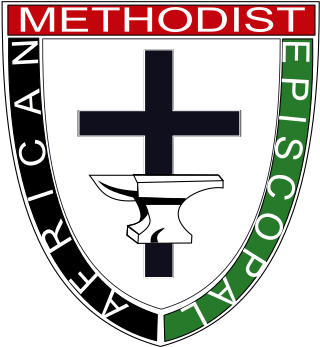
Churches Uniting in Christ (CUIC) is an ecumenical organization that brings together mainline American denominations, and was inaugurated on January 20, 2002, in Memphis, Tennessee on the balcony of the Lorraine Motel. It is the successor organization to the Consultation on Church Union.

An episcopal polity is a hierarchical form of church governance in which the chief local authorities are called bishops. The word "bishop" here is derived via the British Latin and Vulgar Latin term *ebiscopus/*biscopus, from the Ancient Greek ἐπίσκοπος epískopos meaning "overseer". It is the structure used by many of the major Christian Churches and denominations, such as the Catholic, Eastern Orthodox, Oriental Orthodox, Church of the East, Anabaptist, Lutheran, and Anglican churches or denominations, and other churches founded independently from these lineages. Many Methodist denominations have a form of episcopal polity known as connexionalism.
Methodism, also called the Methodist movement, is a Protestant Christian tradition whose origins, doctrine and practice derive from the life and teachings of John Wesley. George Whitefield and John's brother Charles Wesley were also significant early leaders in the movement. They were named Methodists for "the methodical way in which they carried out their Christian faith". Methodism originated as a revival movement within Anglicanism originating out of the Church of England in the 18th century and became a separate denomination after Wesley's death. The movement spread throughout the British Empire, the United States and beyond because of vigorous missionary work, and today has about 80 million adherents worldwide.
The United Methodist Church (UMC) is a worldwide mainline Protestant denomination based in the United States, and a major part of Methodism. In the 19th century, its main predecessor, the Methodist Episcopal Church, was a leader in evangelicalism. The present denomination was founded in 1968 in Dallas, Texas, by union of the Methodist Church and the Evangelical United Brethren Church. The UMC traces its roots back to the revival movement of John and Charles Wesley in England, as well as the Great Awakening in the United States. As such, the church's theological orientation is decidedly Wesleyan. It embraces liturgical worship, holiness, and evangelical elements.
Full communion is a communion or relationship of full agreement among different Christian denominations or Christian individuals that share certain essential principles of Christian theology. Views vary among denominations on exactly what constitutes full communion, but typically when two or more denominations are in full communion it enables services and celebrations, such as the Eucharist, to be shared among congregants or clergy of any of them with the full approval of each.
The African Union Methodist Protestant Church (AUMPC), abbreviated as A.U.M.P. Church, is a Methodist denomination. It was chartered by Peter Spencer (1782–1843) in Wilmington, Delaware, in 1813 as the "Union Church of Africans", where it became known as the "African Union Church".
The Spencer Churches are two African-American Christian denominations in the United States that resulted from an 1860s schism in the Union Church of Africans. That denomination was founded by Peter Spencer, a freed slave, in Wilmington, Delaware in 1813.

Ecumenism – also called interdenominationalism, or ecumenicalism – is the concept and principle that Christians who belong to different Christian denominations should work together to develop closer relationships among their churches and promote Christian unity. The adjective ecumenical is thus applied to any non-denominational initiative that encourages greater cooperation and union among Christian denominations and churches.

The African Methodist Episcopal Church, usually called the AME Church or AME, is a Methodist denomination based in the United States. It adheres to Wesleyan-Arminian theology and has a connexional polity. It cooperates with other Methodist bodies through the World Methodist Council and Wesleyan Holiness Connection.
The Continuing Anglican movement, also known as the Anglican Continuum, encompasses a number of Christian churches, principally based in North America, that have an Anglican identity and tradition but are not part of the Anglican Communion.

The Christian Methodist Episcopal Church (C.M.E.C.) is a Methodist denomination that is based in the United States. It adheres to Wesleyan-Arminian theology. Though historically a part of the black church, the Christian Methodist Episcopal today has a church membership of people from all racial backgrounds.

The African Methodist Episcopal Zion Church, or the AME Zion Church (AMEZ) is a historically African-American Christian denomination based in the United States. It was officially formed in 1821 in New York City, but operated for a number of years before then. The African Methodist Episcopal Zion Church adheres to Wesleyan-Arminian theology.

The Consultation on Church Union (COCU) was an effort towards church unity in the United States, that began in 1962 and in 2002 became the Churches Uniting in Christ. It was a significant part of the Christian movement towards ecumenism. This effort can be seen in the context of the worldwide ecumenical attitude that was manifested in the 1948 formation of the World Council of Churches, the 1950 formation of the National Council of Churches, the 1957 formation of the United Church of Christ, and the formation of the Roman Catholic Pontifical Council for Promoting Christian Unity during the Second Vatican Council. The original task of COCU was to negotiate a consensus between its member denominations.

The Church of South India (CSI) is a united Protestant Church in India. It is the result of union of a number of Protestant denominations in South India that occurred after the independence of India.

The Church of North India (CNI) is the dominant united Protestant church in northern India. It was established on 29 November 1970 by bringing together most of the Protestant churches working in northern India. It is a province of the worldwide Anglican Communion and a member of the World Methodist Council and the World Communion of Reformed Churches. The merger, which had been in discussions since 1929, came eventually between the Church of India, Pakistan, Burma and Ceylon (Anglican), the Methodist Church, Disciples of Christ, and some congregations from the United Church of Northern India.
The Church of Pakistan is a united Protestant Church in Pakistan founded in 1970; it holds membership in the Anglican Communion, the World Communion of Reformed Churches, and the World Methodist Council.

The Reformed Episcopal Church (REC) is an Anglican Church. It was founded in 1873 in New York City by George David Cummins, a former bishop of the Protestant Episcopal Church.

The Episcopal Church (TEC), based in the United States with additional dioceses elsewhere, is a member church of the worldwide Anglican Communion. It is a mainline Protestant denomination and is divided into nine provinces. The presiding bishop of the Episcopal Church is Michael Bruce Curry, the first African American bishop to serve in that position.











